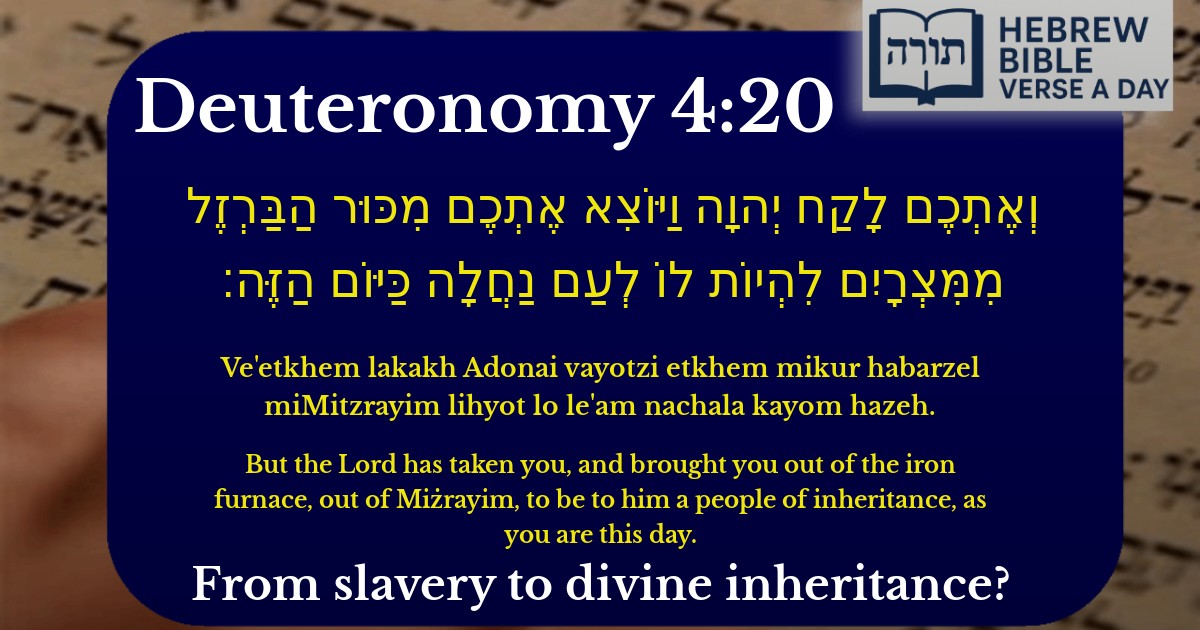Join Our Newsletter To Be Informed When New Videos Are Posted
Join the thousands of fellow Studends who rely on our videos to learn how to read the bible in Hebrew for free!
Hebrew Text
וְאֶתְכֶם לָקַח יְהוָה וַיּוֹצִא אֶתְכֶם מִכּוּר הַבַּרְזֶל מִמִּצְרָיִם לִהְיוֹת לוֹ לְעַם נַחֲלָה כַּיּוֹם הַזֶּה׃
English Translation
But the Lord has taken you, and brought you out of the iron furnace, out of Miżrayim, to be to him a people of inheritance, as you are this day.
Transliteration
Ve'etkhem lakakh Adonai vayotzi etkhem mikur habarzel miMitzrayim lihyot lo le'am nachala kayom hazeh.
Hebrew Leining Text
וְאֶתְכֶם֙ לָקַ֣ח יְהֹוָ֔ה וַיּוֹצִ֥א אֶתְכֶ֛ם מִכּ֥וּר הַבַּרְזֶ֖ל מִמִּצְרָ֑יִם לִהְי֥וֹת ל֛וֹ לְעַ֥ם נַחֲלָ֖ה כַּיּ֥וֹם הַזֶּֽה׃
Parasha Commentary
📚 Talmud Citations
This verse is quoted in the Talmud.
📖 Berakhot 32b
The verse is referenced in a discussion about the merit of the Israelites and God's choice of them as His people, highlighting the metaphor of the iron furnace to describe their suffering in Egypt.
📖 Megillah 14a
The verse is cited in the context of discussing the miracles performed for Israel, emphasizing their deliverance from Egypt as a foundational event in their relationship with God.


The Iron Furnace of Egypt
The verse describes Egypt as a "כּוּר הַבַּרְזֶל" (iron furnace), a metaphor Rashi explains as a crucible that purifies metal. Just as a furnace removes impurities from iron, the suffering in Egypt refined Bnei Yisrael, preparing them to receive the Torah and become Hashem's chosen nation. The Midrash Tanchuma (Va'era 5) compares this to a king who tests his son through hardship to prepare him for royal duties.
Becoming a Treasured Nation
The phrase "לְעַם נַחֲלָה" (people of inheritance) is interpreted by Ramban as indicating Israel's eternal status as Hashem's treasured possession. The Sforno notes this parallels the language of "עם סגולה" (treasured nation) in Shemot 19:5, emphasizing our unique covenant relationship with the Divine that persists "כַּיּוֹם הַזֶּה" (as you are this day).
Theological Implications
Contemporary Application
Rabbi Samson Raphael Hirsch teaches that this verse reminds every generation that our national identity stems from the Exodus experience. Just as the furnace purified our ancestors, life's challenges continue to refine the Jewish people for our eternal mission. The Netziv in Ha'amek Davar emphasizes that our survival "as you are this day" proves the enduring truth of this divine relationship.